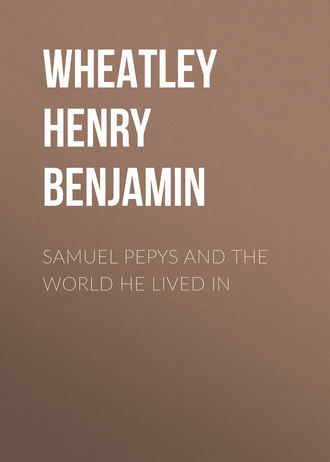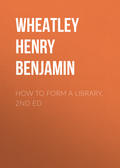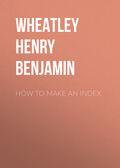
Wheatley Henry Benjamin
Samuel Pepys and the World He Lived In
CHAPTER VI.
LONDON
“I have vow’d to spend all my life in London. People do really live no where else; they breathe and move and have a kind of insipid dull being, but there is no life but in London. I had rather be Countess of Puddle-dock than Queen of Sussex.”—T. Shadwell’s Epsom Wells, 1676.
HAVING concluded that portion of our subject which relates more particularly to the personal character of Pepys, we now pass on to the general consideration of the component parts of the world he lived in. As Pepys was a thorough Londoner, and as most of the circumstances related in the “Diary” refer to London, I propose to commence with a notice of some parts of the capital at the time of the Restoration.
The almost constant use of the River as a highway is a marked feature of the habits of the time, which is illustrated by the fact that Pepys makes a point of mentioning that he went to a place “by land,” when from some cause or other he did not take a boat; thus, on March 8th, 1659–60, we read, “Home about two o’clock, and took my wife by land to Paternoster Row, to buy some paragon for a petticoat, and so home again.” When Pepys was appointed Clerk of the Acts, and he was settled in his house in Seething Lane, he found that a constant communication was necessary between the Navy Office in the City, and the Admiralty at Whitehall. In his frequent journeys by boat from place to place, he often stopped at Blackfriars, in order to visit Lord Sandwich at the “Wardrobe,” where the royal clothes were kept. Sometimes, when there were shows and pageants on the Thames, it was no easy matter to get a boat, and on the occasion of the Queen’s coming to town from Hampton Court, when her barge was attended by ten thousand barges and boats, Pepys in vain tempted the watermen with a bribe of eight shillings.140 One of the chief dangers of boat traffic was found in “shooting” London Bridge, and it was generally considered good policy to get out of the boat and pass from side to side on foot instead of going through the arches. One Sunday night,141 however, our Diarist passed through the “rapids,” and did not like the sensation he experienced. “And so to Whitehall to Sir G. Carteret, and so to the Chappell, where I challenged my pew as Clerke of the Privy Seale, and had it, and then walked home with Mr. Blagrave, to his old house in the Fishyard, and there he had a pretty kinswoman that sings, and we did sing some holy things, and afterwards others came in, and so I left them, and by water through the bridge (which did trouble me) home, and so to bed.” It was not, however, much safer on the bridge than under it, for on one occasion Pepys nearly broke his leg there. He had been in Southwark, spending the evening at the well-known inn, the “Bear at the bridge foot,” and when he wished to get home he could not find his coach, so he was forced to go over the bridge through the darkness and the dirt. His leg fell into a hole, although there was a constable standing by to warn persons away from the dangerous spot. At first he thought his leg was broken, but when he was pulled up he was found not to be much hurt.142
One of the advantages which our forefathers possessed over us, was to be found in the nearness of the fields and country lanes to their offices and shops. Pepys often indulged himself in a walk or a romp over the grass, in places that are now covered with bricks. On July 29th, 1669, he writes: “I dined, and in the afternoon, with Dick Vines and his brother Payton, we walked to Lisson-greene and Marybone and back again.” On October 9th, 1660, he says, “I met with Sir W. Pen again, and so with him to Redriffe by water, and from thence walked over the fields to Deptford, the first pleasant walk I have had a great while.” One Sunday he goes to Clerkenwell Church, and walks home across the fields.143 At another time he takes the air in the fields beyond St. Pancras.144 There is, however, another side to this pleasing picture; for these places were not always safe, and the pleasure-seekers were sometimes alarmed. One day Pepys and a friend were walking from Chelsea into town, when they were joined by a companion, and we read that, “coming among some trees near the Neate houses he began to whistle, which did give us some suspicion, but it proved that he that answered him was Mr. Marsh (the Lutenist) and his wife, and so we all walked to Westminster together.”145 In the following year Pepys walked from Woolwich to Rotherhithe on a fine moonshiny night, but he was accompanied by three or four armed men.146 It gave him much satisfaction to be thought of enough importance to have such an escort provided for him unasked.
So much for the country parts near the town, but the streets appear to have been even less safe after dark. Those who wanted to find their way had to carry links,147 as those without them fared but badly. The gates of the City were shut at night, but this had the effect of shutting in some of the ill-disposed as well as in shutting out others. Pepys and his party on coming home one night from the play found the gates closed. He goes on to say in the “Diary,” “At Newgate we find them in trouble, some thieves having this night broke open prison. So we through and home; and our coachman was fain to drive hard from two or three fellows which he said were rogues that he met at the end of Blowbladder Street.”148
A London mob has never been famed for politeness, and we do not gain a very pleasing view of those in Pepys’s day from some of the entries in the “Diary.” On the 27th of November, 1662, the Russian Ambassador entered the city, and the trained bands, the King’s Life Guards, and wealthy citizens clad in black velvet coats with gold chains were ready to receive him. Pepys did not see the Ambassador in his coach, but he was pleased with the “attendants in their habits and fur caps, very handsome, comely men, and most of them with hawks upon their fists to present to the King.” He adds, however, “But, Lord! to see the absurd nature of Englishmen, that cannot forbear laughing and jeering at everything that looks strange.”
The high road of Newgate Street was formerly crowded in a most inconvenient degree by the shambles of the butchers, and our Diarist once got into trouble while driving past them. The account of this adventure is amusing, from the ease with which he got out of his difficulty. “My coach plucked down two pieces of beef into the dirt, upon which the butchers stopped the horses, and a great rout of people in the street, crying that he had done him 40s. and £5 worth of hurt; but going down I saw that he had little or none; and so I give them a shilling for it, and they were well contented.”149
The following is a good sample of the quarrels that were constantly occurring; there being no authority to put a stop to such exhibitions. “Great discourse of the fray yesterday in Moorfields; how the butchers at first did beat the weavers (between whom there hath been ever an old competition for mastery), but at last the weavers rallied and beat them. At first the butchers knocked down all for weavers that had green or blue aprons, till they were fain to pull them off and put them in their breeches. At last the butchers were fain to pull off their sleeves, that they might not be known, and were soundly beaten out of the field, and some deeply wounded and bruised; till at last the weavers went out triumphing, calling £100 for a butcher.”150 Moorfields, now occupied by Finsbury Square and Circus and the surrounding streets, was at this time one of the chief recreation grounds outside the City walls. It was partly given up to the laundresses and bleachers; and boxers and cudgel-players found in it a congenial sphere for their amusements. On an emergency, the troops were mustered on the fenny ground.
None of Pepys’s days passed without a visit to some tavern, for a morning draught, or a pint of wine after dinner. The notice of these little jovialities has preserved to us the names of several old inns, such as the Star, Half Moon, Harp and Ball, Swan, Bull Head, Plough, Lion, Cock, Greyhound, Globe, Mitre, Cardinal’s Cap, King’s Head, Hercules Pillars, Trumpet, &c. We read in the “Diary,” that on March 6th, 1659–60, there was a friendly meeting at one of these places: “While we were drinking, in comes Mr. Day, a carpenter in Westminster, to tell me that it was Shrove tuesday, and that I must go with him to their yearly club upon this day, which, I confess, I had quite forgot. So I went to the Bell, where were Mr. Eglin, Veezy, Vincent, a butcher, one more, and Mr. Tanner, with whom I played upon a viall and viallin, after dinner, and were very merry, with a special good dinner, a leg of veal and bacon, two capons and fritters, with abundance of wine.” On January 10th, 1659–60, Pepys “drank a pint of wine at the Star, in Cheapside,” and on May 24th, 1662, he took his “morning draft” at the same house. These entries show how rapidly our forefathers went from place to place, and how little they thought of the distance between the City and Westminster; this facility being evidently caused by the water carriage. On a certain day Pepys starts from Axe Yard, drinks his morning draught with a friend, at the Sun, in Chancery Lane, and then goes to Westminster Hall. At noon he visits the Swan, in Fish Street; then goes back to Westminster, looking in at the Coffee Club and the Hall before going home.151 The Swan, in Old Fish Street, is mentioned in an inquisition held before the mayor and aldermen in 1413, as “The Swan on the Hoop.” The house was destroyed in the Great Fire, but was rebuilt and advertised to be let in the “Spectator” of April 25th, 1712.
King Street, Westminster, was full of inns. Pepys’s favourite haunt was the Leg, where an ordinary was held. On December 6th, 1660, he and Mr. Moore went there, and “dined together on a neat’s tongue and udder.” Again, on April 6th, 1661, “with Mr. Creed and More to the Leg, in the Palace, to dinner, which I gave them, and after dinner I saw the girl of the house, being very pretty, go into a chamber, and I went in after her and kissed her.” Two other King Street taverns were visited by Pepys, in July and August, 1660—viz., the Sun and the Dog. These houses of entertainment are both noted as haunts of Ben Jonson, in Herrick’s Address to the Shade of “Glorious Ben.”
“Ah, Ben!
Say how or when
Shall we, thy guests,
Meet at these lyric feasts
Made at the Sun,
The Dog, the Triple Tun?
Where we such clusters had
As made us nobly wild, not mad!
And yet such verse of thine
Outdid the meat, outdid the frolic wine.”
Another Sun, that behind the Exchange, was a famous house frequented by Pepys; it was rebuilt after the Fire by John Wadlow, the host of the Devil Tavern, and son of the more famous Simon Wadlow whom Ben Jonson dubbed “Old Sym, the King of Skinkers.” Pepys often went with his colleagues to the Dolphin, and drank “a great quantity of sack” there. On April 25th, 1661, he “went to an ordinary at the King’s Head, in Tower Street, and there had a dirty dinner.” On June 21st, of the same year, we read, “This morning, going to my father’s, I met him, and so he and I went and drank our morning draft at the Samson, in Paul’s Churchyard.” On October 9th, he went after the theatre “to the Fleece tavern, in Covent Garden, where Luellin, and Blurton, and my old friend, Frank Bagge, was to meet me, and there staid till late, very merry.” This was the chief tavern in Covent Garden, but being the resort of bullies, it obtained a very unenviable notoriety. The Green Dragon, on Lambeth Hill, the Golden Lion, near Charing Cross, the Old Three Tuns at the same place, and the Pope’s Head, in Chancery Lane, are among the other taverns mentioned by Pepys. The Rhenish Wine-house, in the Steelyard, Upper Thames Street, was a favourite resort, and is frequently mentioned by the old dramatists. Pepys went there sometimes, but he more often visited another house so called in Cannon Row. All kinds of drinks were alike agreeable to our Diarist, and he did not even disdain “mum,” a strong beer brewed from wheat, which was once popular and sold at special mum-houses.
These constant visits to taverns were not very conducive to temperate habits of life, and we therefore read much of the midday revellings of the business men. One day, Pepys being a little more sober than Sir W. Penn, has to lead that worthy knight home through the streets, and on another occasion he resolves not to drink any more wine,—a rash vow which he forthwith breaks. Sometimes with amusing casuistry he tries to keep his vow to the letter while he breaks it in the spirit; thus, to allude again to the characteristic entry, on October 29th, 1663, we read, “Went into the Buttery, and there stayed and talked, and then into the Hall again; and there wine was offered, and they drunk, I only drinking some hypocras,152 which do not break my vow, it being, to the best of my present judgement, only a mixed compound drink, and not any wine. If I am mistaken, God forgive me! but I hope and do think I am not.”
We have seen Pepys dividing his time pretty equally between the City and Westminster, and doing official work in both places. In Westminster Hall he was on friendly terms with all the shopkeepers who formerly kept their little stalls in that place, and most of the watermen at the different stairs, who recognized his genial face, were emulous of the honour of carrying him as a fare. There is an entry in the “Diary” which records a curious custom amongst the stationers of the Hall. Pepys went on January 30th, 1659–60, to “Westminster Hall, where Mrs. Lane and the rest of the maids had their white scarfs, all having been at the burial of a young bookseller.”
Two of the most important events in the history of Old London,—viz., the Plague and the Fire,—are very fully described in the “Diary.”
On the 7th of June, 1665, Pepys for the first time saw two or three houses marked with the red cross, and the words “Lord have mercy upon us” on the doors; and the sight made him feel so ill at ease that he was forced to buy some roll tobacco to smell and chew. Then we read of the rapid increase in the numbers of those struck down; of those buried in the open Tuttle-fields at Westminster; and of the unfriendly feelings that were engendered by fear.
Pepys remained either in town or in its neighbourhood during the whole time of the raging of the pestilence; and on the 4th of September, 1665, he wrote an interesting letter to Lady Carteret, from Woolwich, in which he said: “The absence of the court and emptiness of the city takes away all occasion of news, save only such melancholy stories as would rather sadden than find your ladyship any divertissement in the hearing. I have stayed in the city till above 7,400 died in one week, and of them above 6,000 of the plague, and little noise heard day or night but tolling of bells; till I could walk Lumber Street and not meet twenty persons from one end to the other, and not fifty upon the Exchange; till whole families, ten and twelve together, have been swept away; till my very physician, Dr. Burnet, who undertook to secure me against any infection, having survived the month of his own house being shut up, died himself of the plague; till the nights, though much lengthened, are grown too short to conceal the burials of those that died the day before, people being thereby constrained to borrow daylight for that service; lastly, till I could find neither meat nor drink safe, the butcheries being everywhere visited, my brewer’s house shut up, and my baker, with his whole family, dead of the plague.”
He then relates a romantic incident which had just occurred, and a note of which he also inserted in his “Diary:” “Greenwich begins apace to be sickly; but we are, by the command of the king, taking all the care we can to prevent its growth; and meeting to that purpose yesterday, after sermon with the town officers, many doleful informations were brought us, and, among others, this, which I shall trouble your ladyship with the telling. Complaint was brought us against one in the town for receiving into his house a child brought from an infected house in London. Upon inquiry, we found that it was the child of a very able citizen in Gracious Street, who, having lost already all the rest of his children, and himself and wife being shut up, and in despair of escaping, implored only the liberty of using the means for the saving of this only babe, which, with difficulty, was allowed, and they suffered to deliver it, stripped naked, out at a window, into the arms of a friend, who, shifting into fresh cloathes, conveyed it thus to Greenwich, where, upon this information from Alderman Hooker, we suffer it to remain.”
On the 20th of this same month of September we read in the “Diary:” “But, Lord! what a sad time it is to see no boats upon the River, and grass grows all up and down White Hall court, and nobody but poor wretches in the streets.” And on October 16th, Pepys is told that, in Westminster, “there is never a physician, and but one apothecary left,—all being dead.”
In the following January, the question of attending to the overcrowded churchyards had begun to agitate the public mind; and those who lived in their immediate neighbourhood were anxious that they should be covered with lime.153 Not many months after this the greater portion of the city had become a void.
On the 2nd of September, 1666, Pepys was called up at three o’clock to see a fire; but not thinking much of it, he went to bed again. When, however, he got up, he found that about 300 houses had been burnt in the night. All were now busy in moving their property from place to place; and the women worked as hard as the men in doing what was needed. Some almost incredible instances of meanness are recorded in the “Diary,” respecting those rich men who gave shillings grudgingly to those who saved their all. Alderman Starling, whose house was saved by the Navy Office men, while the next house was burning, gave 2s. 6d. to be divided among thirty of them, and then quarrelled with some that would remove the rubbish out of the way of the fire, on the score that they came to steal. Sir William Coventry told Pepys of another case which occurred in Holborn. An offer was made to one whose house was in great danger, to stop the fire for a sum that came to about 2s. 6d. a man, but he would only give 1s. 6d.154
Clothworkers’ Hall burnt for three days and nights, on account of the oil in the cellars; and so intense was the heat caused by extension of the fire over a large space, that the ground of the City continued to smoke even in December.155
Moorfields was the chief resort of the houseless Londoners, and soon paved streets and two-storey houses were seen in that swampy place, the City having let the land on leases of seven years.
It was said that this national disaster had been foretold, and the prophecies of Nostrodamus and Mother Shipton were referred to.
Sir Roger L’Estrange, the Licenser of Almanacs, told Sir Edward Walker that most of those that came under his notice foretold the fire, but that he had struck the prophecy out.156 Lady Carteret told Pepys a curious little fact, which was, that abundance of pieces of burnt papers were driven by the wind as far as Cranborne, in Windsor Forest; “and, among others, she took up one, or had one brought her to see, which was a little bit of paper that had been printed, whereon there remained no more nor less than these words: ‘Time is, it is done.’”157
It is well known that the unfortunate Roman Catholics were charged with the crime of having set London on fire, and there appears to have been a very sufficient reason why the people should persist in affirming this fable. The judges determined, in the case of disputed liability between landlord and tenant, that the tenants should bear the loss in all casualties of fire arising in their own houses or in those of their neighbours; but if the fire was caused by an enemy they were not liable. As one poor man was convicted and hanged for the crime, it was held that the landlords must be mulcted.158 Public opinion shifted about in this matter, for we read that on September 16th, 1667, Pepys saw “a printed account of the examinations taken, touching the burning … showing the plot of the Papists therein, which it seems hath been ordered to be burnt by the hands of the hangman, in Westminster Palace.”159
London remained in ruins for many months, and as late as April 23rd, 1668, Pepys describes himself as wearily walking round the walls in order to escape the dangers within. At last new streets of houses arose from the ruins, but, unfortunately, in spite of the proposals of Wren, Hooke, and Evelyn for erecting a handsome and well-arranged city, the old lines were in almost every case retained.
A passage in the “Diary” in which Pepys remarks on the great streets “marked out with piles drove in the ground,” and expresses the opinion that, if ever so built, they will form “a noble sight,” would seem to show that at one time a better plan of building was contemplated.160
Had the plan suggested in Parliament by Colonel Birch been carried out, great difficulties would have been avoided. His proposal was, that the whole ground should be sold and placed in trust. Then the trustees were to sell again, with preference to the former owners, by which means a general plan of building might have been adopted; but an unequalled opportunity of making London into a fine city was let slip.161
At one time it was supposed that the Fire would cause a westward march of trade, but the City asserted the old supremacy when it was rebuilt.
Soon after the conclusion of the “Diary,” Pepys left the Navy Office, and the latter years of his life were spent partly in York Buildings and partly at Clapham. It was after the Restoration that the West End grew into importance, and the house at the foot of Buckingham Street, from the windows of which Pepys could look out upon the river, was not built when the Diarist was settled in Crutched Friars. It was erected upon part of the site of York House, whose last resident was the worthless Buckingham:—
“Beggar’d by fools, whom still he found too late,
He had his jest, and they had his estate.”
This house, in which Pepys was pleased to find “the remains of the noble soul of the late Duke of Buckingham appearing, in the door-cases and the windows,”162 was sold by his son and demolished in 1672.
As Pepys left London so it remained in its chief features for more than one hundred years, and it was not until the beginning of the present century that the vast extension of the town to the north and south began to make itself felt.






